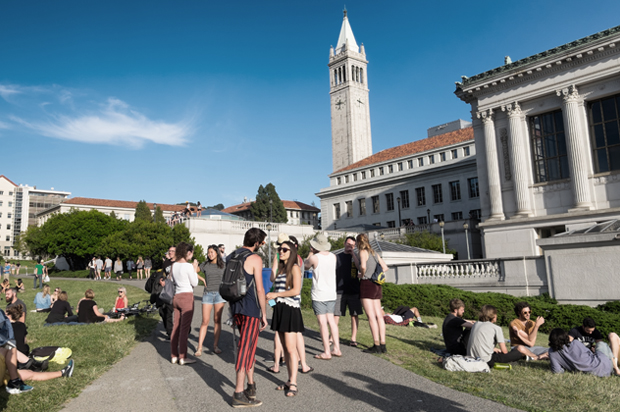Higher education in the United States has long been subject to a right-wing smear campaign painting college campuses as incubators for dangerous radicalism. There is little doubt that the election of President Donald Trump, who ran a campaign with explicit anti-intellectual currents, has increased its ferocity.
In late May, Keeanga-Yamahtta Taylor, assistant professor of African-American Studies at Princeton University, was forced to cancel public speaking appearances after receiving a slew of death threats in response to her outspokenness on the issue of racism in America. Johnny Eric Williams, a tenured professor of sociology at Trinity College, was suspended and forced into hiding due to similar threats over an article on race he shared on his personal social media accounts. Essex County College adjunct instructor Lisa Durden lost her job for defending an all-black Memorial Day event on the show of conservative pundit Tucker Carlson. And Drexel University professor George Ciccariello-Maher has once again found himself the target of a right-wing campaign demanding his firing due to his controversial tweets, which have brought on an investigation into his social media activity by his employer.
These conditions present the perfect moment for the Left to redouble its commitment to defending higher education, both to show solidarity with the many liberals and leftists who make their lives in academia, and to protect the importance of the free exchange of ideas under our bottom-line-focused capitalist system.
We face a moment when both the Left and the Right are giving American campus activism a gimlet eye, with debates raging over the balance of “safe spaces” and “trigger warnings” with principles of free speech and association. While student activism can’t be a lone focal point of a broader social justice movement, defending higher education and organizing on campus is still of tantamount importance for the Left.
1. Campuses are sites of class struggle
The City University of New York system, to which this writer is professionally associated, enrolls more than 270,000 people at its senior and community colleges — the size of a small American city. The majority of these students are working-class and non-white. Considering the number of adjunct workers struggling in the precariat, as well as clerical and maintenance workers, it is clear that such environments are ripe for class-based organizing. In smaller towns that host universities, these institutions often employ large sections of the population. Just as General Motors would be the focus of organizing in a car company town, college towns should see the university as the organizing focal point in their locality.
2. Campuses are critical for free exchange
Universities, both public and private, remain some of the few open spaces for discourse in an often closed-off society. Columbia University professor of English Bruce Robbins pointed out during a talk in 2014 at St. Mark’s Bookshop in New York that, in the aftermath of 9/11, universities were among the only spaces in a shell-shocked country were people could hold open discussion and debate without having to pepper their positions with appeals to patriotism or out of fear that attempts to understand the attacks would be interpreted as support.
3. Universities hold real power
Just as a free press is necessary for advancing free thought, so too is preserving spaces for academic pursuit. The ideas developed within the academy can have an outsized impact on shaping how we view fields of study and on policy making both within and outside of government. Just look at the impact Milton Friedman-inspired neoliberal economics have had on economic departments in universities across the country, and on solidifying free-market hegemony. There’s a reason why the David Horowitzes of the world so fear radical, left-wing ideas in humanities departments. The Right wouldn’t take this concern so seriously if they didn’t rightly see universities as institutions that hold real power.
4. Free college is our demand
One of the most appealing messages of both Bernie Sanders’ and Jeremy Corbyn’s campaigns was their call for free college. This demand holds that access to higher education and intellectual pursuits should be a public right and not a privileged commodity. In the United States, polls show that 60 percent of the population supports the idea, making it one of the most popular demands of an emerging 21st century social democratic project.
5. Students have done right in the past
It’s easy for some to dismiss privilege-shaming and cultural-appropriation obsessions in today’s U.S. campus activism. But throughout U.S. history, student activism has proven to be crucial in a variety of important left-wing struggles, from the Civil Rights movement to the protests against the Vietnam War to the boycott and divestment campaign against apartheid South Africa. It would be an offense against the historical record to ignore the important role campus activists — both students and professors — have played in these struggles.
6. Universities are employers and landowners
The Left should be organizing on campuses precisely because they are in positions of immense economic power. If you want to fight economic inequality in New Haven, you must understand how Yale University operates and organize against its managerial class. In New York City, the archetypal ‘tale of two cities,’ both Columbia University and New York University are enormous landowners and play a critical role in the political economy of the city. If you want to lift wages in a town where the university is the biggest employer, then your best bet is to start forming unions at the school.
In many locations, the fight for economic progress involves fighting against university administrations in their roles as real estate barons and employers, and that means organizing all of the affected constituencies: faculty, staff and students.
The Right has convinced millions of voters into falsely believing that greying, left-wing professors are teaching our children to hate God and whiteness, and therefore liberal higher education must be destroyed. This may sound laughable until you remember the Trump administration currently faces no checks from Congress and the Republican Party controls the majority of state governments. The ability to hamper the freedom of our public universities is no small matter, while many of the nation’s private colleges become accessible solely to the elite.
The campus — like the warehouse, rail yard or retail facility — is a vital site of political organizing. Let’s rededicate ourselves to treating it that way.


